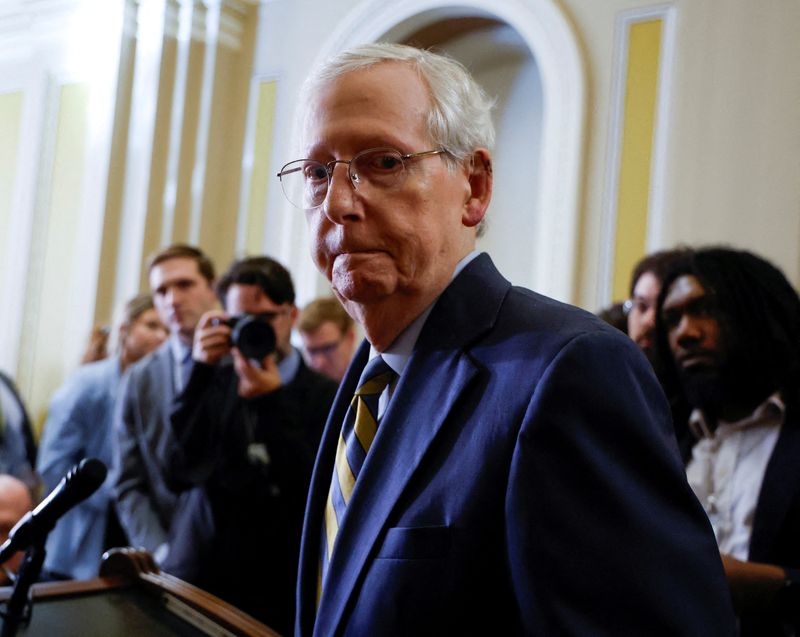(Reuters) - Top U.S. Senate Republican Mitch McConnell on Wednesday said he would not seek another term as the party's leader, marking an end to a record-setting career.
The Kentucky senator was reviled by Democrats for his obstructionism and embraced by his own caucus for advancing a conservative agenda. Here are some facts about him:
CHILDHOOD POLIO
Born in Alabama, McConnell spent two years during his childhood undergoing treatment for polio, he wrote in his memoir. He moved to Kentucky as a child with his family before attending college in the state.
After working as a congressional aide and in Republican President Gerald Ford (NYSE:F)'s administration, McConnell became a judge-executive in Jefferson County, Kentucky, before his election to the U.S. Senate in 1984, according to his congressional biography.
'GRIM REAPER'
McConnell was elected to lead his caucus in 2006, during Republican President George W. Bush's second term, and served as minority leader during Democratic President Barack Obama's first six years in office.
When his party captured a Senate majority during Obama's last two years, McConnell flexed that muscle. In early 2016, following the death of conservative U.S. Supreme Court Justice Antonin Scalia, he refused even to consider holding a vote for Obama's nominee to succeed Scalia, Merrick Garland, saying he wouldn't consider any nominee in an election year.
McConnell embraced the nickname "Grim Reaper" for his enthusiastic blocking of Democratic priorities.
RESHAPING JUDICIARY UNDER TRUMP
McConnell's blocking of Garland set the stage for a reshaping of the Supreme Court when Republican Donald Trump won the White House. McConnell helped the Senate confirm conservative nominees Neil Gorsuch and Brett Kavanaugh, reversing what had been a 5-4 liberal majority at the end of Obama's second term.
McConnell again enraged liberals in the final months of Trump's term in office when liberal Justice Ruth Bader Ginsburg died in September 2020. While that was less than two months before a presidential election, McConnell set aside his qualms about confirming a nominee in an election year and hustled Justice Amy Coney Barrett's confirmation through about a week before the 2020 election.
That established a solid 6-3 conservative majority on the court that could stand for years.
McConnell has called his work reshaping the federal judiciary to be his greatest achievement. He also played a significant role in the passage of Trump's signature piece of legislation, a 2017 tax overhaul, and for years worked to rein in campaign finance limits.
REPUBLICAN IRE
A staunch conservative, McConnell has feuded with Trump, rejecting the former president's false claims that voter fraud cost him the 2020 election against Democrat Joe Biden.
The rift between McConnell and Trump deepened when the Senate leader said Trump was "practically and morally responsible" for the Jan. 6, 2021, attack on the U.S. Capitol, when hundreds of Trump supporters stormed the building to try to prevent Congress from certifying Biden's win.
McConnell also angered some in his party in 2021, during Biden's first year in the White House, when he helped shepherd a deal through the Senate to avoid a default on the national debt.
In 2023, Trump's closest allies in the Senate mounted a challenge to McConnell's leadership position after Republicans had a weaker than expected showing in the 2022 midterm elections. McConnell easily fended it off, however.
McConnell's wife of 30 years, businesswoman Elaine Chao, served as secretary of labor in the George W. Bush administration from 2001 to 2009 and as secretary of transportation in the Trump administration from 2017 to 2021.
HEALTH SCARES
McConnell froze up twice last summer while speaking to reporters, incidents that raised questions about how long he would be able to hold onto his post.
In September, the doctor of Congress said in a statement that the two episodes did not appear to be the result of a stroke or seizure, but offered no explanation of what caused McConnell to stand speechless and wide-eyed during two press conferences.

McConnell was also sidelined for weeks last year after he tripped at a Washington dinner on March 8 and was admitted to a hospital for treatment of a concussion and a minor rib fracture. He returned to the Senate in April.
Throughout those incidents, McConnell declined to offer many details about his health.